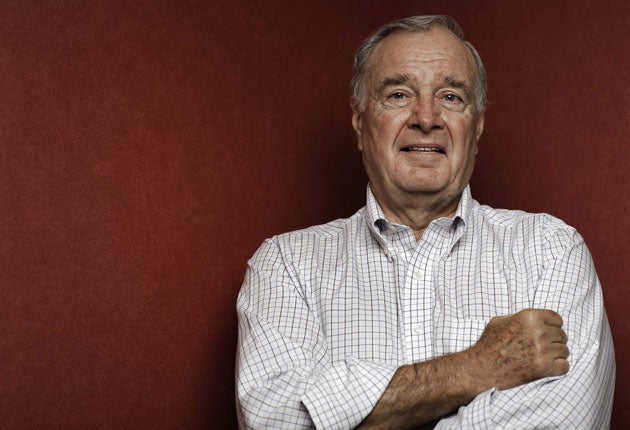Meet the godfather of the cuts
Canada's Paul Martin eradicated his country's deficit by harsh reductions in public spending. Matt Chorley meets the coalition's inspiration

Your support helps us to tell the story
From reproductive rights to climate change to Big Tech, The Independent is on the ground when the story is developing. Whether it's investigating the financials of Elon Musk's pro-Trump PAC or producing our latest documentary, 'The A Word', which shines a light on the American women fighting for reproductive rights, we know how important it is to parse out the facts from the messaging.
At such a critical moment in US history, we need reporters on the ground. Your donation allows us to keep sending journalists to speak to both sides of the story.
The Independent is trusted by Americans across the entire political spectrum. And unlike many other quality news outlets, we choose not to lock Americans out of our reporting and analysis with paywalls. We believe quality journalism should be available to everyone, paid for by those who can afford it.
Your support makes all the difference.One might expect the godfather of public spending cuts to have an air of menace about him, hunkered down in his lair slicing away at treasured services. But to meet Paul Martin in a smart suite at the Grosvenor Hotel gives little away about his work eliminating Canada's $42bn budget deficit in the 1990s.
The genial 72-year-old former prime minister is in demand, dispensing in a soft Canadian drawl advice to anyone looking to erase the red ink from their national finances. He refuses to confirm that he has held informal talks with ministers on how to eradicate Britain's £151bn deficit, but the coalition is clear that what happened across the Atlantic a decade and a half ago is the inspiration for their plan to reach fiscal equilibrium.
Mr Martin insists the Government has no choice but to cut – and cut hard. "If you look at Greece you really begin to understand this. The reason for doing it is 100 per cent economic." He says social programmes can only be protected in the long term by removing "this sword of Damocles that's hanging overhead – which is this deficit".
"Once you've measured your cloth, you cut it and proceed," he says, in one of many warnings to the Tories and Lib Dems that there can be no rowing back when the going gets tough. "You've got a huge deficit and in my opinion you have no choice but to deal with it."
Opponents of the UK's four-year plan to cut £81bn from public spending may not like it, but Mr Martin has a reputation for ruthlessness that belies his grandfatherly manner. From 1995-98, as finance minister, he reduced public-sector spending in Canada by a fifth, which included cutting the budget of the industry and transport departments by 55 and 40 per cent respectively. A deep deficit became a surplus.
Unlike the coalition's pledge to protect the NHS and overseas aid from cuts, Mr Martin insisted as a fundamental principle that there could be no ring-fencing. But he believes the coalition's decision to increase foreign aid funding through the Department for International Development has been "recognised throughout the world" and will pay "huge dividends" for the UK, not least in attracting business and influencing public policy in Africa, where he has a special interest including a project to protect forests in Congo.
As Canada was cutting spending, it was also tightening bank regulation, meaning it was spared the worst of the financial collapse that saw Britain's banking sector teeter on the edge. "Economic downturns are going to happen, but an economic downturn that has at its core a bank failure is the difference between a windstorm and a tornado," Mr Martin says now. He believes the G20 has a "crucial" role to play in enforcing tighter regulation. To reach a global deal, the "psychology of the West" must change, he says, but so too must the psychologies of China and India, which have "got to recognise that with their growing economic strength come growing economic responsibilities".
He backs President Obama's tax on the banks and the bailouts, while heaping praise on UK politicians, including Mr Cameron and Labour's Ed Miliband. "I think you're actually very well served by your political leaders." Those on the sharp end of the coalition's axe, which bears Mr Martin's fingerprints, may not agree.
The process of cutting may be similar but the "circumstances are very different", he says. Britain is reining in spending in an age of global austerity, although going it alone, as Canada did, has its own problems. "People said, why us? Why is nobody else dealing with it?" He spent 18 months trying to win public support for cuts. The jury is still out on whether the coalition did the groundwork to persuade voters here of the need for spending reductions.
While "fundamentally" Mr Martin has no regrets about the work to balance Canada's books, he says: "There were some areas where I think we may have cut too much, and as soon as we eliminated the deficit, I immediately began to repair it." This could be a warning to Mr Osborne. Research funding was so badly hit in Canada that Mr Martin later set up endowment funds to ensure no one could repeat his mistake. Once back in the black, he also introduced record increases in funding for health and education.
After eradicating the deficit, Mr Martin then forced out Jean Chrétien to become Prime Minister. If George Osborne is following the Canadian plan to the letter, David Cameron could also be facing the chop.
Join our commenting forum
Join thought-provoking conversations, follow other Independent readers and see their replies
Comments